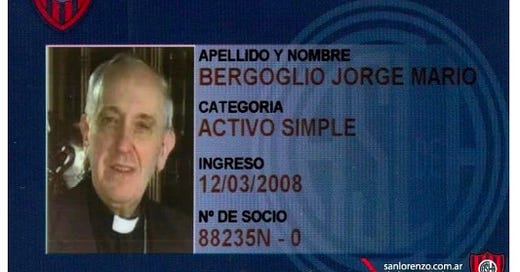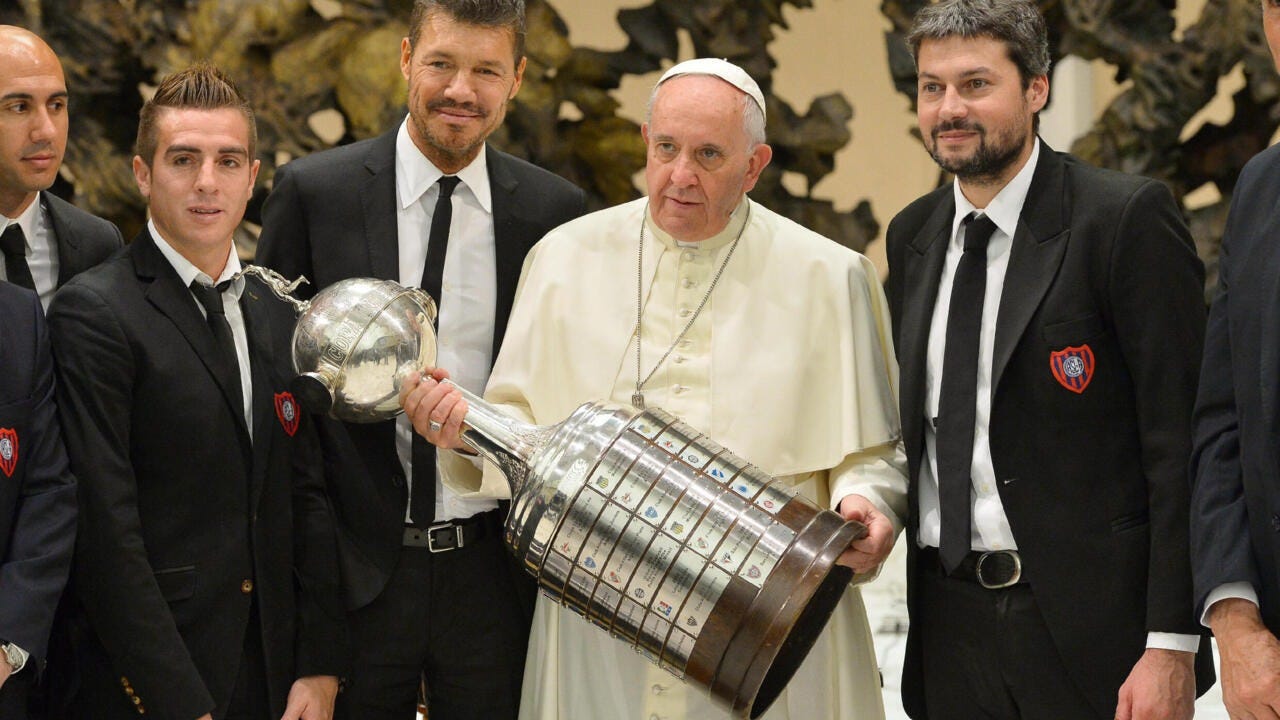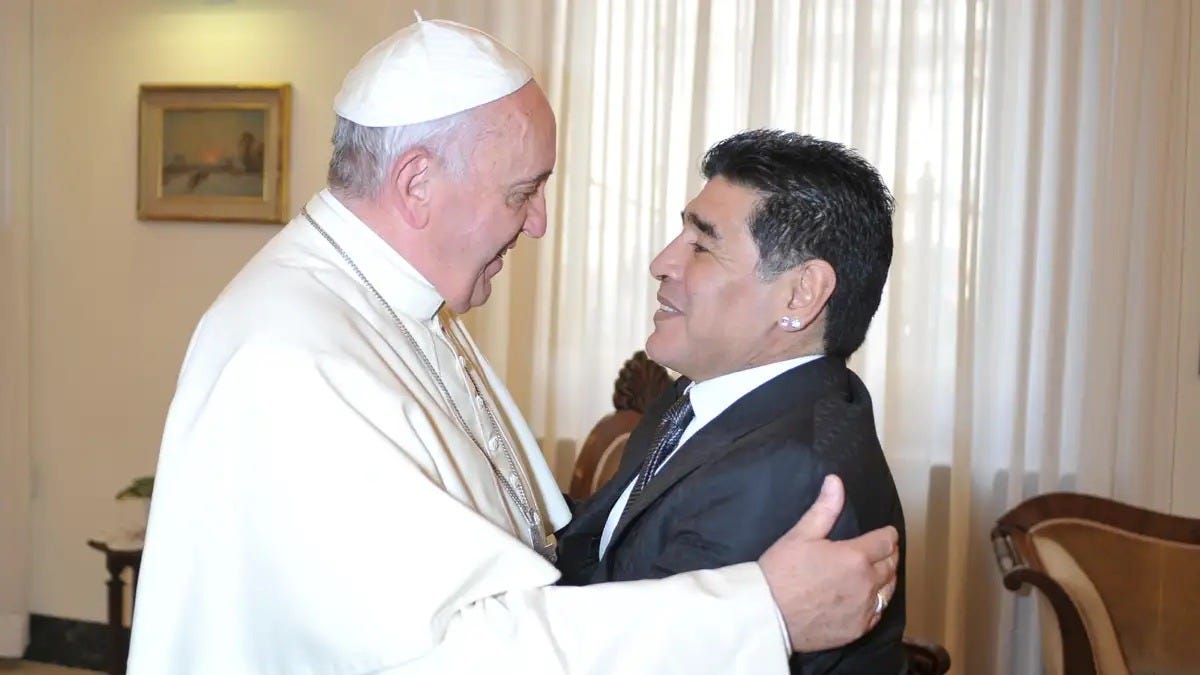Have most recent pontiffs been advocates of sport? Clue: Is The Pope a Catholic?
Pope Francis was a lifelong football fan, and his predecessors loved sport too. But that's just one subject we consider today. Imminent disappointment is the other...
There are two stories in this piece, based on entirely unrelated events of the past few days. One relates to popes and sport, and the other to the confirmed promotions of Leeds and Burnley from the Championship to the Premier League.
At the end of their 2025-26 season in the Premier League, Burnley will go straight back down to the second tier, as will whichever club goes up via the play-offs, while Leeds will struggle and will likely join them. I’ll get into the reasons why later.
The popes tale is slightly left-field, but I had a long drive on Monday and I spent the whole journey listening to the radio and discovering a wealth of information about Pope Francis, who died at 7.35am that morning.
I found it fascinating, so assume there’s a small chance you might too.
I knew Pope Francis, aka Jorge Mario Bergoglio, was from Argentina, and had been the head of the Catholic church since 2013. I knew he was the first pope from South America, or indeed from the global south, of 266 popes in the past two millennia. (I had to check that).
I knew that any pope’s death would be a big deal because there are around 2.3bn Christians on the planet, and around 1.4bn are baptised Catholics.
I knew Pope Francis was a lifelong football fan; his team was San Lorenzo, one of Argentina’s “Big 5” alongside Boca Juniors, River Plate, Independiente and Racing Club.
Pope Francis was also a huge admirer of his compatriot Diego Maradona, who he called “a poet on the pitch” and about whom he wrote a chapter in his autobiography, “Hope”. (I didn’t know that).
I also didn’t know Pope Francis was nicknamed the ‘Pope of the Peripheries’, and before that the ‘Bishop of the slums’. I didn’t know he had been a nightclub bouncer in Buenos Aires in his youth, or the extent to which he bucked centuries-old papal trends to foster better relations with the gay community and minorities, and advocated for action to tackle the climate crisis.
I didn’t know he had appointed 108 of the 135 cardinals from around the world who are eligible to gather for the 2025 papal conclave next month. (If you haven’t seen "Conclave", by the way, I recommend it).
And while I knew he loved football, I didn’t know he was a card-carrying San Lorenzo socio (registered member) of that club, including throughout his entire time in the Vatican. Below is his actual socio membership card.
Note his membership number: 88235. It is entirely coincidental - isn’t it? - that he was 88 when he died, and the precise time in Argentina when he died was … 2.35am. Perhaps God does work in mysterious ways!
"The Pope leaves an unbreakable legacy," San Lorenzo’s president, Marcelo Moretti, told Reuters on Monday. "For all San Lorenzo fans, he was a source of great pride. It is a very sad day.”
The club used their Twitter account to pay tribute to him in various ways.
When San Lorenzo won the Copa Libertadores for the first and only time to date in 2014, Pope Francis hosted the team at the Vatican and held the trophy (below).
Pope Francis would often talk about the value of sport, and football. He said football can teach people three valuable lessons to promote peace and solidarity. They are:
The need to train and work hard to achieve goals.
The importance of fair play and teamwork.
A requirement for respect and honourable behaviour towards opponents.
“To win, we must overcome individualism, selfishness, all forms of racism, intolerance and manipulation of people,” he said, adding that being “greedy” in football, as in life, is an obstacle.
In his autobiography, Pope Francis recalled inviting Maradona to the Vatican (below), where he teased the great player about the ‘Hand of God’ goal from the 1986 World Cup.
“I asked him, jokingly, 'So, which is the guilty hand?’,” Pope Francis said.
Asked whether Maradona or Messi was the greatest player, he replied: "Maradona, as a player, was great. But as a man, he failed.” He then described Messi as a "gentleman", but said he would choose Pele above both of them, as "a man of heart”.
Pope Francis’s predecessor, Pope Benedict XVI, aka Joseph Ratzinger from Germany, was also a big football fan. Born in Bavaria in 1927, he was a Bayern Munich supporter.
In 2013, the year he retired as Pope (the first Pope to retire in 600 years), a bishop who had worked for him for many years, Josef Clemens, wrote an academic article for the The Sport Journal about Pope Benedict XVI’s observations on sport, especially football, and what they tell us about life.
The Pope before Benedict XVI was Pope John Paul II, aka Karol Józef Wojtyła from Poland, famously a goalkeeper in his youth and a lifelong fan of Cracovia, one of the two major clubs in Kraków.
(Pope John Paul II was the Pope of my lifetime. I was raised as a Catholic - the primary reason for my atheism / agnosticism - and saw Pope John Paul II “live” in June 1982 at Ninian Park, Cardiff, on his 1982 UK Tour, when I was 12. He rode around the perimeter of the pitch in his Popemobile, and I took a whole reel of photos that I was able to see a week later when they came back from Boots. They were all rubbish.)
Pope John Paul II’s predecessor Pope John Paul I was the only Pope since the First World War who had no discernible connection to sport. He was also the shortest serving Pope in history, in office for just 33 days before a death that sparked umpteen conspiracy theories.
His predecessor, Pope Paul VI (pope from 1963 to 1978), famously waved the starting flag for the 1974 Giro d'Italia, and his predecessor, Pope John XXIII (pope from 1958 to 1963) was also a cycling fan, and his sporting hero was Gino Bartali, winner of the 1938 and 1948 Tours de France.
Pope John XXIII once told Bartali: “Listen Gino, I’m rather stocky. There are a lot of gardens here at the Vatican and I have a bicycle, but I don’t ride very well. If you could give me a hand…”.
Pope John XXIII’s predecessor was Pope Pius XII, pope from 1939 to 1958, who was also a huge cycling fan, and a fan of Bartali. And his predecessor, Pope Pius XI (pope from 1922 to 1939) was an accomplished mountaineer. He was the first person to summit Switzerland’s highest mountain, Monte Rosa, from the eastern slope. He also climbed the Matterhorn and the route he scaled to Mont Blanc in July 1890 is named after him (the “Papal Route”).
If you think that is the last you’ll hear about popes for a while, then good luck with that! The 2025 papal conclave is expected to begin sometime between 6 May and 12 May and the build-up and outcome will remain global news.
And so to today’s other story: why Burnley and probably the other two teams promoted from the Championship this season will be getting relegated back there at the end of 2025-26.







